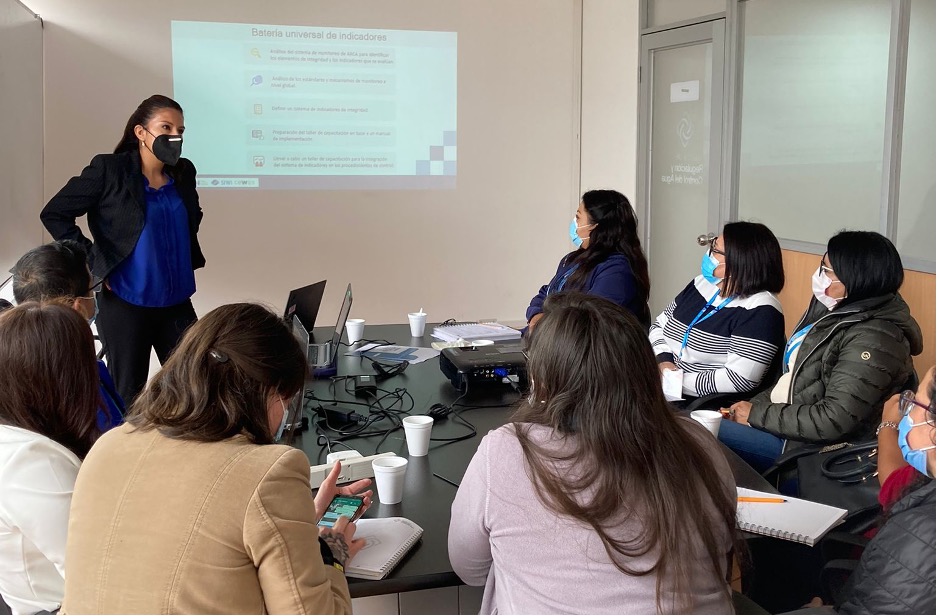Ecuador keen to improve integrity practices in the water and sanitation sector
The Integrity Consortium, as formed by Water Integrity Network (WIN), the Stockholm International Water Institute (SIWI), and the Centre for Water and Sanitation Entrepreneurship (cewas) – with the support of the Inter-American Development Bank – began providing technical assistance to the Water Regulation and Control Agency of Ecuador (ARCA) in early 2022. The Consortium works to ensure that the human rights to water and sanitation are realized, through the proactive improvement of integrity and transparency of ARCA, as well as appropriate monitoring of integrity levels of its associated water utility companies.
Background
The Integrity Consortium has been collaborating with the Inter-American Development Bank (IADB) since 2016, through the Integrity Programme. Since that time, the collaboration has contributed to the implementation of IDB’s Technical Cooperation program, which strives for transparency, information management, and governance in the water and sanitation sector. Thanks to the technical and financial support of the IADB, the Consortium adapted the Integrity Management Toolbox (IMT), a set of resources and workshop methodologies to support integrity management, for the Latin American context and implemented it with utilities, regulators, and policy makers in seven countries in Latin America: Argentina, Ecuador, El Salvador, Guatemala, Honduras, Mexico, and Paraguay.
The Integrity Consortium also works with capacity development to strengthen the skills, knowledge, and aptitudes of the key actors in the water and sanitation sector, which is necessary to initiate and ensure the success of change processes for integrity. With regards to the Consortium’s work with ARCA, the technical support is divided into two processes:
- The implementation of the Integrity Management Toolbox for Regulators includes a step-by-step process comprised of seven phases of which six are implemented during in-person workshops. Each phase provides inputs for the next in a logical sequence of steps that analyse the risks of the lack of integrity in an organization and the associated repercussions. The analysis also offers a set of instruments that can be applied to prevent risks from materializing. In Ecuador, most of the facilitation was carried out by a mix of short presentations and group exercises.
- The methodology for the selection of integrity indicators is carried out by a group of experts in ARCA. Their expertise ensures that the evaluation and selection of indicators, which measure the integrity levels of service providers, is carried out in an objective manner.
Outcomes
The Consortium’s initial face-to-face workshop was led by SIWI and held during the first week of June 2022 with 26 attendees from various departments within ARCA. The workshop lasted three days, during which each of the implementation phases of the integrity change process were applied in a practical and participatory way.

Participants learned about the concept of integrity and its four pillars: transparency, accountability, participation, and anti-corruption. In addition, they created their own business model in which they identified the segments that related to the context of their institution.
Through an individual voting methodology, they were then able to identify a total of 14 risks, which were distributed to roundtables in the workshop for further analysis within the business model. A total of six risks were selected through prioritisation and consensus sessions, from which 13 associated instruments were identified to mitigate these risks. The business model was again used to understand the positive impact these instruments would have if implemented, and prioritisation and consensus was again achieved with all participants. Finally, five areas for improvement were identified and translated into concrete work plans with responsibilities, targets, indicators, activities, and deadlines:
- Human resources
- Water resources, irrigation and drainage, drinking water and sanitation
- Research and information management and technical areas
- General technical coordination /technical departments of ARCA
- Anti-corruption
The assigned change agents will oversee the implementation of each area of improvement with the support of the Consortium.








